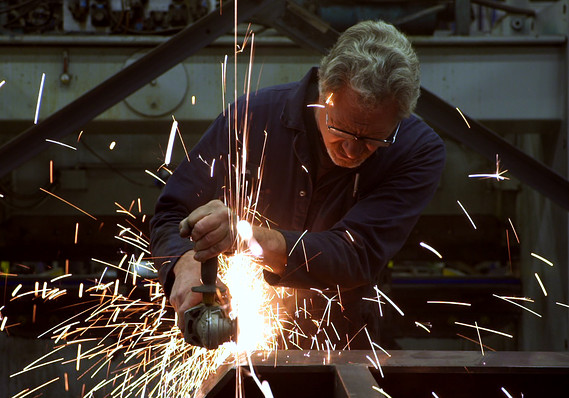U.S. Manufacturing Isn’t Dead Yet
But for manufacturing to succeed, the business community, institutions of higher education, policymakers and consumers need to make some major changes.
Many of us have the image of a post-World War II-era assembly line, but times have changed and our modern facilities require individuals that can work with sophisticated machinery. In fact, as we toured 32 cities in 32 days on our American manufacturing bus tour, the majority of manufacturers from towns like Tupelo, Miss., and Warren, Penn., complained that there are jobs available but there is a lack of eligible candidates with specialty degrees who are trained to work for the factories.
So, how do we educate and train young adults to be workforce-ready?
Jobs are a key barometer for the economy. Twenty years ago, U.S. manufacturers employed 17 million Americans; today that number stands at 12 million. To compete with these steadily dropping numbers, we need to provide the apprenticeship training necessary for a new generation of American worker to grow as fast as our technology is changing.
And there are innovative schools out there that are teaching young adults the skills necessary to operate new machinery and programs. In schools like Ranken Technical College in St. Louis, Mo., students are being trained on cutting-edge equipment for jobs in the construction and manufacturing industries.
The proof is in the data. These schools have a nearly 98% placement rate and often work with local businesses to employ graduates in hometown companies.
Although education leads to employment, consumers have to be willing to buy American.
Free-range chickens, local oranges and organic avocados in your grocery store. We are largely conscious consumers in that we increasingly research where our food is produced, yet too many Americans don’t take the time to research and demand their t-shirts, jeans and everyday living necessities are made domestically. And some of this burden falls on the manufacturers and storeowners who need to promote the “Made in America” brand.
The perfect example of a major company producing in America is the athletic shoe company New Balance that employs about 1,300 workers in New England alone. While critics make the claim that American-made products are more expensive, New Balance sneakers are competitively priced to foreign-made shoes like Nike.
But what role does Washington D.C. have in this movement? Better yet, what should they be doing to keep jobs in America?
Instead of burying the responsibility in the halls of the U.S. Department of Commerce, we agree with many scholars and thought leaders that there should be a separate agency focused on manufacturing.
A U.S. Department of Manufacturing could create national standards, guidelines and incentives for manufacturers.
As filmmakers, we get tax incentives for making our movies in certain states. Why not do the same for manufacturing companies? Tax incentives would keep U.S. companies from outsourcing and lure jobs back from overseas. In fact, this idea of bringing companies back to America would help bring almost five million jobs to our shores by 2020, reducing our stagnant unemployment rate by three percentage points.
And some — unfortunately, few — are fighting for U.S. jobs in the Halls of Congress.
Scott Paul, president of Alliance for American Manufacturing, a partnership made up of American manufacturers and the United Steelworkers union, has offered great ideas on how to improve our manufacturing policy overseas. He’s called for a refocus on “trade agenda by giving American businesses new tools to counter China’s currency manipulation, industrial subsidies, intellectual property theft and barriers to market access.”
Our country is eager to re-energize U.S. manufacturing and in some towns they are already taking the necessary steps. We are hopeful that success stories slowly coming out of our small and large cities will help motivate a united effort by consumers, educators, the business community and policy makers to bring jobs back to America.
Vincent Vittorio and Nathan McGill are directors of the upcoming documentary “American Made Movie,” premiering nationwide on Aug. 30 .



Leave a Reply
Want to join the discussion?Feel free to contribute!